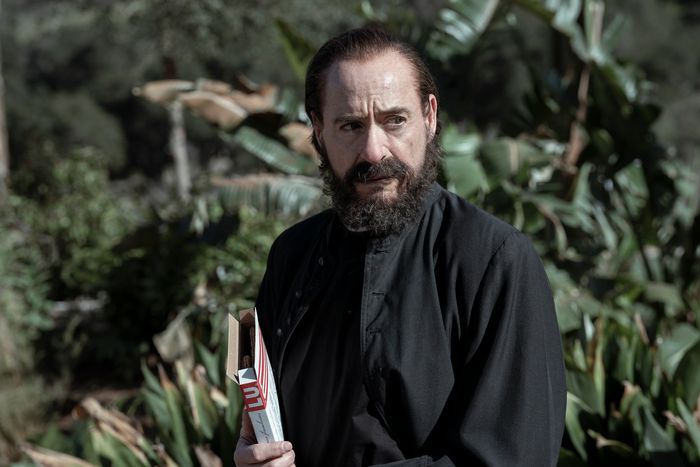
In an Emmys year with quite a few certainties (is there any doubt that Jeremy Allen White is going to win again for The Bear?), one of those sure bets seems to be that Robert Downey Jr. will win an Emmy — his first — for his performance in HBO’s limited series The Sympathizer. But recent developments in his career have me wondering whether this narrative has shifted beneath his feet, opening up space for what turns out to be a surprisingly robust category full of competitors.
First, though, let’s lay out the case for RDJ winning. To start, he’s the biggest star in the category by a factor of about a billion. Particularly when it comes to the Limited Series categories, star power very often matters. Just look at recent wins for Michael Keaton (Dopesick), Kate Winslet (Mare of Easttown), and Ewan McGregor (Halston). The Sympathizer made sure to position him as such from the start. Though the HBO adaptation has plenty of its own bonafides — it’s based on Viet Thanh Nguyen’s Pulitzer Prize–winning novel and was brought to the screen by no lesser luminaries than Park Chan-wook and Don McKellar — Downey essentially orbits the main character, the Captain (Hoa Xuande), a North Vietnamese spy sent to the United States after the fall of Saigon. Downey plays Claude, a CIA operative and the Captain’s handler. He also plays Niko Damianos, an egotistical filmmaker who wants the Captain to consult on his war film. He also plays a Reagan-esque congressman, a racist college professor, and, in a final-episode twist, the French priest who is the Captain’s father. In what could fairly be called a stunt, Downey became the face(s) of the series, the showy hook that would hopefully draw in viewers.
Even as The Sympathizer faded into the background of TV’s crowded spring lineup, Downey’s nomination for Outstanding Supporting Actor in a Limited Series was never in doubt. The story was just too good: Downey, riding high off of a post-Marvel renaissance, Oscar statuette in hand, would sweep in, collect an Emmy, and leave people wondering whether this new play will land him a Tony. Let’s call it the Awards Cluster Theory: the idea that an actor or actress winning an award for one medium helps them win in another medium soon after. Viola Davis gets an Emmy for How to Get Away With Murder in 2015, followed by an Oscar 18 months later for Fences. Olivia Colman wins an Oscar for The Favorite in early 2019, followed by an Emmy for The Crown in 2021. Regina King’s Oscar for If Beale Street Could Talk in early 2019 came sandwiched between Emmys for Seven Seconds in 2018 and Watchmen in 2020. Rami Malek: Emmy for Mr. Robot in 2016, Oscar for Bohemian Rhapsody less than three years later.
Add to that the fact that Downey plays multiple characters, a classic awards-bait maneuver that has succeeded time and again. Tatiana Maslany’s Emmy win in 2016 for Orphan Black was considered a huge surprise, but should it have been? She was basically stunting on her competition by playing a half a dozen clones. Mark Ruffalo’s win for I Know This Much Is True in 2020 showed that you don’t even need to be that showboaty with a multiple-character performance to capture voters’ attention.
However, the case against Downey’s assured victory starts with dismantling a lot of those historical precedents. The most famous person in a Limited Series category wins … sometimes. That little axiom didn’t help Robert De Niro or Michelle Pfeiffer when they were nominated for The Wizard of Lies, nor did it add up to an Emmy win for Cate Blanchett in Mrs. America. Penelope’s Cruz’s star power didn’t help her win an Emmy for playing Donatella Versace in American Crime Story, nor did it help Hugh Jackman win despite wide acclaim for Bad Education. Award wins happen in clusters, except when they don’t. The McConaissance wasn’t powerful enough to score an Emmy for True Detective’s Matthew McConaughey mere months after his Oscar win for Dallas Buyers Club. Sam Rockwell’s Three Billboards Outside Ebbing Missouri Oscar win didn’t lead to an Emmy win for Fosse/Verdon. Just last year, Jessica Chastain was thwarted in her effort to follow her Oscar for The Eyes of Tammy Faye with an Emmy for George & Tammy. Playing multiple characters on a single show is a hell of a maneuver that works on Emmy voters — unless you’re Ewan McGregor on Fargo in 2017 (nominated but didn’t win) or Rachel Weisz on Dead Ringers last year (not even nominated).
Trivia aside, though, the thing that might damage Downey’s Emmy chances mostly comes down to a change of circumstances. A few months ago, The Sympathizer was a continuation of a career path that began when Tony Stark snapped his fingers in Avengers: Endgame and ended Downey’s time in the MCU. After the career nadir of Dolittle (he’s said as much), he rebounded in a big way with Oppenheimer. Throughout that movie’s awards-season tour earlier this year, Downey kept alluding to this new phase of his career. His Golden Globes speech referenced restarting his career; in his Oscar speech he noted that “I needed this job more than it needed me.” He told the New York Times that he was “happy that I regained my connection with a more purist approach to making movies.” Standard talking points when promoting a “serious” movie? Perhaps. But after a decade and a half inside a CGI metal suit, playing various congressmen in tony biopics and adaptations of Pulitzer Prize–winning works of literature was a smart career pivot that immediately paid off.
Then Downey showed up at Comic-Con and took off that Doctor Doom mask, having reupped for God knows how many more superhero movies, bailing out the MCU at a time when his career was flourishing. Why Downey returned to Marvel is anyone’s gue$$, but it certainly reframed the story he’d been telling about purist approaches to making movies.
Without that narrative, it becomes a lot easier to poke holes in Downey’s case for an Emmy win. And it was a case that was ripe for hole-poking to begin with. HBO’s positioning of RDJ as the face of a show about the insidious, devastating effects of colonialism was uncomfortable from the start. In her review for Vulture, Kathryn VanArendonk wrote that the series itself falls into that same trap: “So much of the show’s sense of humor is about the way American stories center whiteness. Robert Downey Jr. showing up over and over in roles designed to be largely interchangeable contradicts that aim.”
The optics got even worse when Downey became the only Emmy nomination The Sympathizer got. While there’s precedent for a show’s lone Emmy nomination for an acting performance to end up winning — Tatiana Maslany (Orphan Black), Regina King (Seven Seconds), and Mark Ruffalo (I Know This Much Is True) are but three examples, all fairly recently — it’s certainly not a great sign of enthusiasm for The Sympathizer overall. This just wasn’t a show that resonated with Emmy voters. It wasn’t a show that resonated with anyone. According to Nielsen ratings as reported by TV Series Finale, The Sympathizer ranked 24th out of 29 HBO series over the last five years, measured by the ratings for their most recent season. That puts its viewership lower than shows like White House Plumbers, The Time Traveler’s Wife, and The Idol. (Still higher than the second season of Industry, though).
So if The Sympathizer wasn’t to Emmy voters’ taste, and RDJ’s no longer doing serious actor things, it’s probably time to look into the competition. If not Downey … who? The rest of the Supporting Actor in a Limited Series nominees are:
Jonathan Bailey, Fellow Travelers
Tom Goodman-Hill, Baby Reindeer
John Hawkes, True Detective: Night Country
Lamorne Morris, Fargo
Lewis Pullman, Lessons in Chemistry
Treat Williams: Feud: Capote vs. the Swans
I’m going to set aside Morris and Pullman, two strong performers who are overshadowed by the leads of their shows. That leaves four decently strong contenders to take the trophy.
The rising star of the group is Jonathan Bailey, who’s not only tremendously sympathetic and charismatic in Fellow Travelers but also tremendously sympathetic and charismatic … everywhere? Late Night With Seth Meyers, the Met Gala, wherever. The entire Fellow Travelers press tour was nothing but Bailey and Matt Bomer being some degree of adorable, either with each other, with a bunch of BuzzFeed-provided puppies, or while engaging in a kind of cross-promotional key party with All of Us Strangers stars Paul Mescal and Andrew Scott. There’s also the fact that Bailey is in Bridgerton and could easily pull votes from that show’s partisans within the Academy.
Tom Goodman-Hill doesn’t have the rising-star trajectory that Bailey enjoys, but the case for him sneaking out a surprise victory is stronger than you think. Goodman-Hill picked up his first Emmy nomination for playing the dark, manipulative, and violently abusive mentor to Richard Gadd’s autobiographical lead character, and he’s a contender to win because he’s on the show that might sweep the Limited Series awards. The Emmys as of late have trended toward block voting with one show ending up with three, four, even five major awards. Last year, Beef took five of the seven major awards, as did The White Lotus; in 2021, Mare of Easttown won three of the four Limited Series acting awards. If Baby Reindeer takes Outstanding Limited Series, plus wins for Gadd and/or Jessica Gunning, Goodman-Hill could get swept along with that momentum.
Meanwhile, True Detective: Night Country’s John Hawkes gets to play the actor’s actor card and sweep up some of those gravitas votes that would otherwise go to Downey. Hawkes has been a consummate clock-puncher, guesting on more TV shows than you can count with notable stints on Deadwood and Eastbound and Down. His one Oscar nomination, for Winter’s Bone, saw him working out some of the muscles he used on True Detective, playing a character whose morality is murky at best. He even sings a song (one he wrote and is nominated for)!
Finally, there’s the late Treat Williams, nominated for his performance as Bill Paley on Feud: Capote vs. the Swans. Williams died in June 2023 and Feud is his final show. This is only the second nomination of Williams’s career, after being nominated for playing Michael Ovitz (another tremendously influential figure in the entertainment industry) in The Late Shift. The history of posthumous Emmy nominations is a long one, but it’s hard to glean any coherent trends. There have been lots of nominations over the years, as well as some wins (Chadwick Boseman, most recently, for Outstanding Character Voice-Over Performance in What If? on Disney+) but there have been other occasions where a seemingly surefire posthumous win was thwarted: Desperate Housewives’s Kathryn Joosten won two Guest Actress awards but lost on her third nom, which came after her 2012 death. Carrie Fisher (Catastrophe), John Ritter (8 Simple Rules), Phil Hartman (Newsradio), and Nicholas Colosanto (Cheers) all lost their posthumous nominations. Even Nancy Marchand, considered a shoo-in to win for her role on The Sopranos, got nipped at the finish line by Allison Janney for The West Wing. There is no guarantee that voters will feel the need to grant Williams one for the road.
At this point, the best case for Robert Downey Jr. winning the Emmy is that there’s suddenly too much good competition. Without one singular contender to amass votes, Jonathan Bailey, Tom Goodman-Hill, John Hawkes, and Treat Williams may cannibalize each other’s votes. But even if that’s the case, RDJ is going to have a lot harder time selling the purity-of-the-work angle in this acceptance speech than he did at the Oscars.


